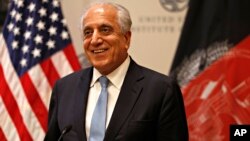The Taliban disclosed Thursday that the United Nations has temporarily removed sanctions against its senior leaders who are negotiating a deal with the United States for ending the 18-year-old war in Afghanistan.
The disclosure by the insurgent group comes as the American reconciliation envoy, Zalmay Khalilzad, and his team are expected to enter a new round of meetings with Taliban interlocutors in Qatar this month. Both sides say the dialogue, which started late last summer, has made steady progress.
Taliban spokesman Zabihullah Mujahid told VOA that the names of all 14 members on their negotiating team and Mullah Abdul Ghani Baradar, who heads the group's informal "political office" in Doha, Qatar, have been taken off the U.N. blacklist. Those on the list are subject to financial sanctions, a travel ban and an arms embargo by all member nations.
There was no immediate U.N. or U.S. reaction to the announcement by the Taliban, nor has the Afghan government commented.
Obstacle to peace efforts
The insurgent group has long viewed U.N sanctions on its leaders as a major obstacle to the peace and reconciliation efforts in Afghanistan. Taliban officials say Khalilzad had promised in the last round of discussions in March that he would look into the Taliban's demand of getting the sanctions temporarily removed.
The U.S. and the Taliban are trying to seal a deal on a withdrawal timeline for all foreign forces in Afghanistan in exchange for Taliban guarantees that they would not allow international terrorists to use the country again for attacks against other nations.
Khalilzad, however, has repeatedly stated he wants a comprehensive Taliban cease-fire and the insurgent group's engagement in an intra-Afghan peace dialogue before Washington concludes an agreement.
Intra-Afghan talks in Qatar
Before their next meeting with the U.S. negotiating team in late April, Taliban representatives are scheduled to host an informal two-day interaction in Qatar on April 19 with politicians inside and outside the Afghan government, tribal elders, civil society, youth and women representatives.
Taliban officials have clarified there will be no official representatives of the Afghan government, and participants at the intra-Afghan meeting will attend it in their personal capacity to express personal views during the discussions.
The insurgents refuse to engage in any talks with the Kabul government, dismissing it as an illegal entity and a product of U.S. "occupation" of Afghanistan.
The informal intra-Afghan meeting will be the second such conference. Moscow hosted the inaugural gathering in February.
The peace overtures come at a time of intensified violence in Afghanistan where both government forces and the Taliban claim to have inflicted massive battlefield casualties on each other in recent days.





